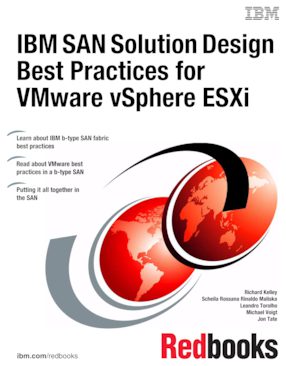Abstract
In this IBM® Redbooks® publication, we describe recommendations based on an IBM b-type storage area network (SAN) environment that is utilizing VMware vSphere ESXi. We describe the hardware and software and the unique features that they bring to the marketplace. We then highlight those features and how they apply to the SAN environment, and the best practices for ensuring that you get the best out of your SAN.
For background reading, we recommend the following Redbooks publications:
- Introduction to Storage Area Networks and System Networking, SG24-5470
- IBM System Storage SAN Volume Controller Best Practices and Performance Guidelines, SG24-7521
- IBM System Storage SAN Volume Controller and Storwize V7000 Replication Family Services, SG24-7574
- Implementing the IBM System Storage SAN Volume Controller V6.3, SG24-7933
- IBM SAN Volume Controller Stretched Cluster with PowerVM and PowerHA, SG24-8142
- Implementing the IBM SAN Volume Controller and FlashSystem 820, SG24-8172
- IBM System Storage DS8000 Copy Services for Open Systems, SG24-6788
- IBM System Storage DS8000: Host Attachment and Interoperability, SG24-8887
This book is aimed at pre- and post-sales support, system administrators, and storage administrators.
Table of Contents
Chapter 1. Introduction
Chapter 2. General SAN design and best practices
Chapter 3. General practices for VMware
Chapter 4. General practices for storage
Chapter 5. Business continuity and disaster recovery
Chapter 6. Entry level scenario
Chapter 7. Midrange level scenario
Chapter 8. Enterprise scenario
